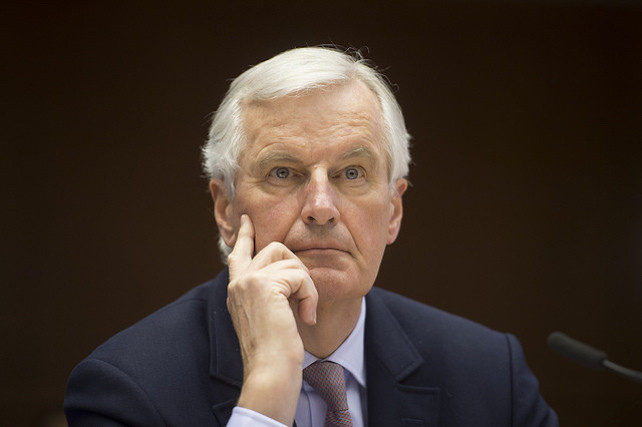In a keynote speech to the Centre for European Reform in London on Monday 20 November, Barnier said that Brexit could be a turning point for the European project, and that historians may look back to 2016 as a “time of awakening”.
Future of Europe
Barnier set out his policy visions for the EU: he was in favour of completing the banking union, of creating a fiscal capacity and a finance minister for the Eurozone. He was also in favour of more cooperation to fight terrorism, Common Foreign and Security Policy and defence.
Barnier argued that the EU should lead global financial regulations to make finance work for the people. He added that an efficient migration policy and the social pillar should be strengthened.
It has been rumoured that Barnier has his eyes set on the post of the European Commission president.
Orderly withdrawal
The Brexit negotiator said that the EU wants close relations with the UK. A “no-deal scenario” was not the EU’s scenario but “we are ready for it.”
He reiterated that the three issues must be solved: the financial settlement, the avoidance of a hard border between Ireland and Northern Ireland, and citizens’ rights. The financial obligations must be fulfilled by the UK; “we owe it to our taxpayers and the beneficiaries of EU funded projects.”
However, Barnier focused mostly on the Irish border. While the point was politically sensitive in the UK and Ireland, he pointed out that the UK was unclear what rules it wants to apply in Northern Ireland, and that the onus lay on the British government to offer solutions. The EU’s position was clear, in that the single market must be preserved.
Freedom implies responsibility
Barnier criticised that no one has offered a sound basis for moving forward. The UK indicated its intention to end the freedom of movement, and the legal reality of that was leaving the single market. The UK would also have to build new capacities in regulation (to replace the EU medicine agency and European Banking Authority, for example).
On financial services, Barnier said there were voices in the UK which said that there won’t be any changes in market access--but Barnier reminded them that Brexit meant Brexit. The UK would lose the passporting rights, but the EU could rule on equivalence.
However, the EU would never compromise on the financial stability of the EU and the Eurozone. He stressed that the EU was committed to the convergence of global rules on financial regulations.
While Barnier said he wanted to avoid trade with the UK under WTO rules, he warned the British government to keep a level-playing field between the UK and the EU. If it looked for a deal which undermined environmental, social standards or state aid rules, it may undermine the chances of ratification by the 27 member states and the European Parliament.
EU offer
Barnier said the EU was ready to offer the most ambitious free trade agreement approach.
But the EU would continue cooperate on combating crime, increase security cooperation and defense, because Europe was more important than Brexit.
Reactions
Peter Mandelson, a former EU trade commissioner, said that the current British conservative government was split between soft leavers and clean breakers. He added that cabinet members such as Boris Johnson and Michael Gove were true proponents of neoliberalism, and wanted to de-regulate environmental and social standards and financial services. He added that they would be happy with the UK being a satellite of the US in financial regulation and did therefore not want to negotiate with the EU and would not mind a no deal scenario.
However, Mandelson speculated as well that Brexit may even destroy Brexit with its complexities.
John Bruton, former Taoiseach (Irish prime minister), said that it would be better to have a negotiation phase of six rather than just two years.
